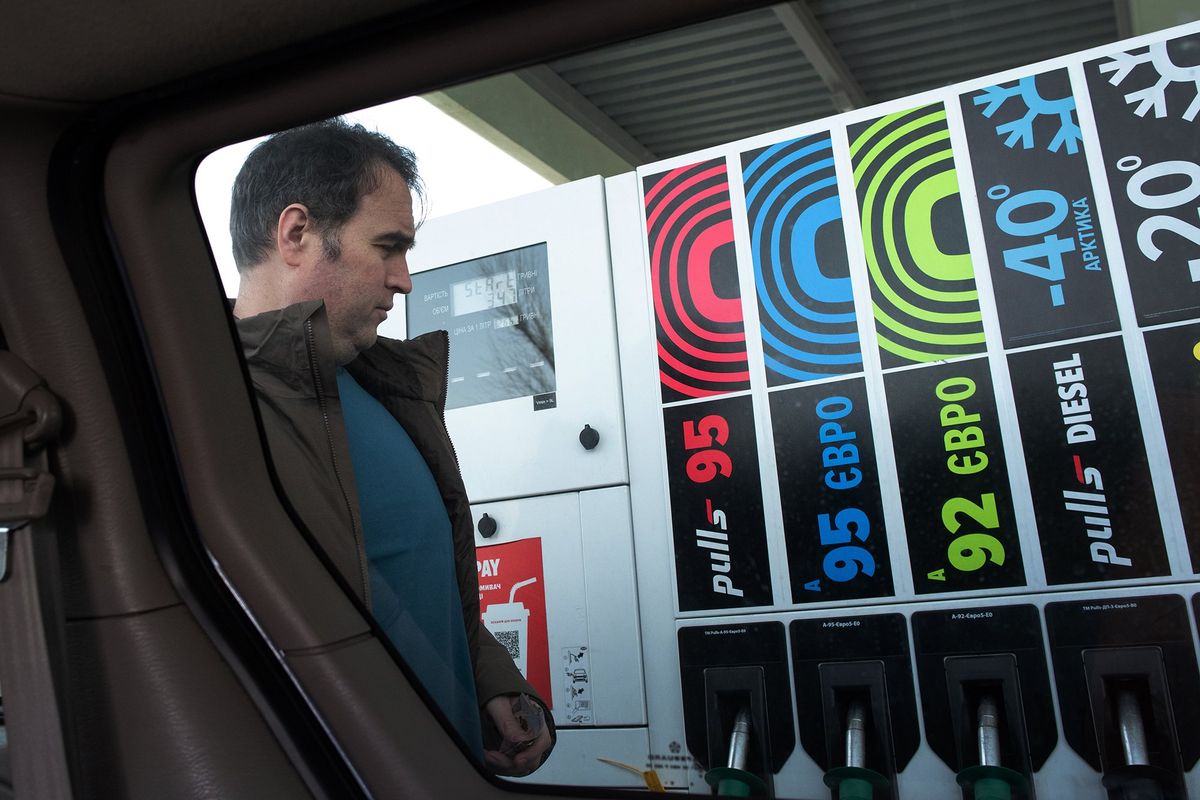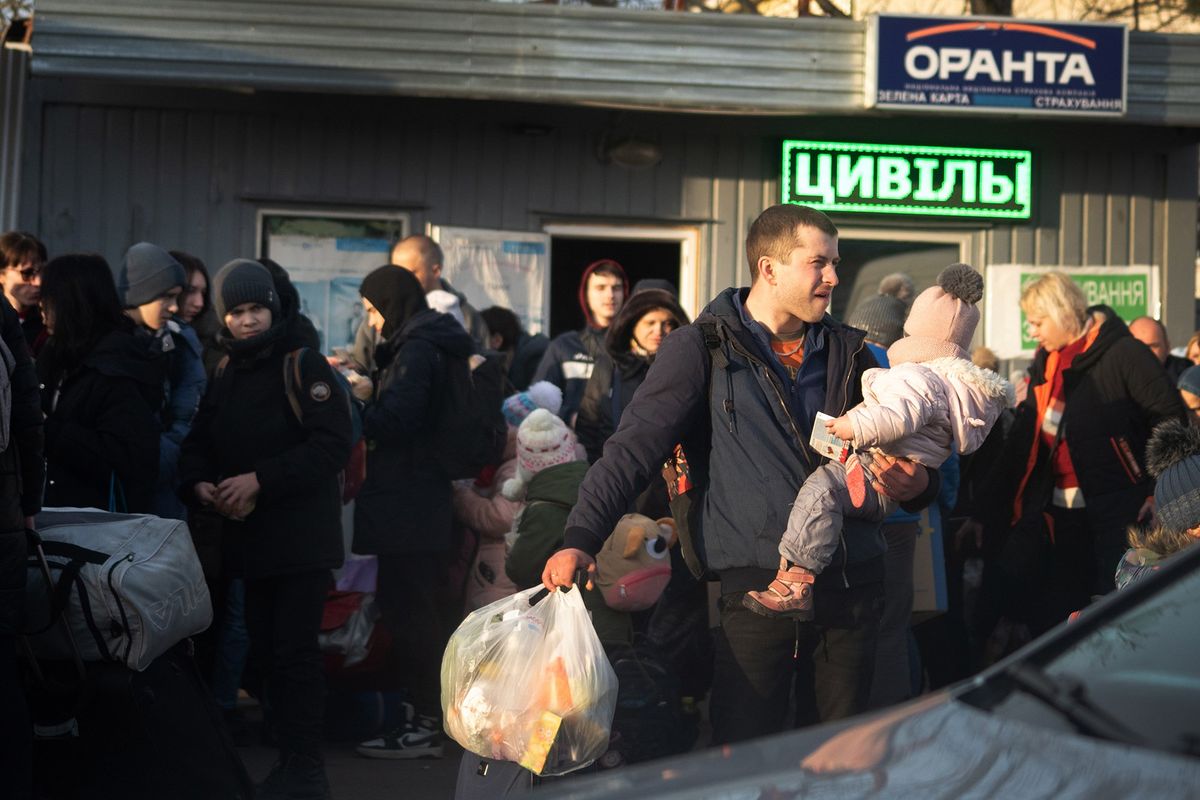Spokane doctor joins flood of refugees to Poland after being told his medical services are no longer needed

LVIV, UKRAINE – An alarm blared, the eerie whine piercing the early morning quiet and waking Kyle Varner.
The noise was unfamiliar to the Spokane doctor who was sleeping on the floor of a hotel in Lviv, Ukraine. Here in Lviv, though, the alarm has become a regularity since Russia invaded in late February. For the most part, locals ignore the sirens, although bomb shelters unused for decades throughout the city have reopened.
Still, it was an unnerving experience for Varner. Groggy, he put on his shoes, strategically placed the night before, and stumbled into the hallway. No one else exited their rooms and, after a moment of wondering where exactly to go, the alarm ended, Varner returned to his makeshift bed and snagged a few more hours of sleep.
Eli Francovich / The Spokesman-Review
It was the appropriate ending to a frustrating and confusing 24 hours for Varner, a physician at Providence Holy Family Hospital who’d arrived in Ukraine Thursday night after driving from Poland. He’d come loaded with supplies from Spokane and with a letter of invitation from a military hospital asking for help. They’d told him local media would be there to document his arrival and set the example for other foreign doctors looking to help soldiers and civilians injured in the fighting.

However, things change – particularly in war – and Varner spent all of Friday in a hospital room waiting to hear what was next. By 4 p.m., he was informed that he was not needed and was told that hospitals in some areas of Ukraine like Lviv were at 50% occupancy, with 100% staffing. Varner found himself with neither a room to sleep in that night, nor a clear purpose in the midst of a war.
At the same time, rumors bubbled up online and on the streets that Belarusian soldiers were massing near the border, set to invade Ukraine at 9 p.m. If that happened, the route by which Varner and Tom Palmer, a friend and associate, had entered Ukraine would no longer be safe.
The two discussed options over coffee at the Cat Café in Lviv’s city center, the soothing setting in sharp juxtaposition to the conversation’s dire details. Jarring as it may have been, it was an appropriate contrast. Despite the air raid sirens and the ongoing war, daily life has continued in Lviv, which is 350 miles from the frontlines. Men, women and children walked the streets Friday shopping, eating and going to work. One Ukrainian man talked enthusiastically about Lviv’s beauty, the trails and hills within an hour’s drive of the hustle and bustle of downtown.
Still, there are signs of war.
Heavily armed police and soldiers patrolled, and markers point toward the nearest bomb shelters. An influx of refugees from farther east has meant more traffic. Hotel rooms are booked, and the Lviv train station has seen 10,000 or more people arriving daily. Fortified checkpoints guard the cities’ entrances and exits, restaurants and bars are prohibited from selling beer or alcohol, and photos are discouraged.
Palmer found that out the hard way his first night in the city. He was driving to his hotel and following a local man through city traffic when he became separated from the man and had to pull over. In hopes of orienting himself, he took a photo of a nearby street sign and texted it to his guide. He was immediately accosted by heavily armed police swathed in black clothing and face coverings. A few tense minutes transpired, the police believing Palmer was a spy or saboteur, and Palmer trying to explain what he was doing. The Ukrainian man returned and explained the situation, and all was OK.
Eli Francovich / The Spokesman-Review
Palmer recounted that story at the Cat Cafe while Varner wondered what to do next. Frustrated as he was, he acknowledged that “it is what it is.”
He considered going to a Red Cross aid station at the railway station and helping there, or perhaps driving back to Poland and gathering more supplies. Or shuttling refugees from the border and taking them farther into Poland. All depended on whether Belarus invaded that evening.
“It’s all going to go to (expletive),” Varner predicted. But by 9 p.m. the Belarusians had not invaded, and Varner went to sleep in the small hotel room he shared with Palmer.
After the air raid siren woke him early Saturday morning, Varner slept a few more hours and arose to a largely static situation. Russian forces remained far in the east, although several western cities were bombed overnight. Rumors continued circulating that Belarus would invade. Or maybe not? No one knew. Belarus said they wouldn’t, and Varner decided that he would be most useful on the Polish side of the border, gathering supplies or shuttling refugees from the border farther into Poland.
Eli Francovich / The Spokesman-Review
So, he started the trek back to Poland, normally a two-hour drive. About an hour out of Lviv, traffic slowed, a line of cars driving toward the border. Then traffic crawled until finally he reached the border and a whirling mass of uprooted humanity. Hundreds of women and children shuffled forward, suitcases and pets in tow. Volunteers poured coffee and handed out food, and Ukrainian guards checked each vehicle to make sure men of fighting age (18 to 60 years) weren’t trying to flee.
Passports and papers were checked and then Varner, after a six-hour trip from Lviv, was back in Poland and the safety of the NATO alliance. He planned to spend Saturday night at a hotel in Warsaw. The setback won’t deter Varner, who believes that if Russian President Vladimir Putin isn’t “stopped in Ukraine, we will end up at war with him.”
Spokesman-Review reporter Eli Francovich traveled to Eastern Europe this week to cover a Spokane doctor’s efforts to assist Ukrainians suffering as a result of the invasion by Russia. The trip was paid for largely by Spokesman-Review readers who have donated to the Community Journalism Fund and through the newspaper’s Northwest Passages event series. To help support this trip and similar newsroom efforts, contributions can be made at spokesman.com/thanks.